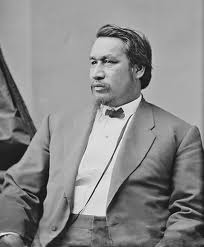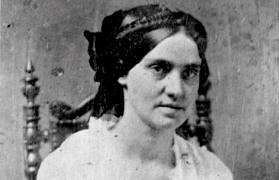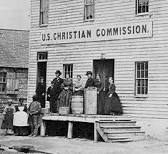By Gary Farrow, Danville Historical Society
Although part of the alliance of Northern states, Illinois, especially the southern portion of Lincoln’s home state, was a hotbed of rebel sentiment. Not only was it a place where plots against its sister state Ohio originated, the political environment became so dysfunctional that the Governor suspended the legislature. While Democrats and Republicans were feuding with one another in the North, the wives and families of soldiers in the South scratched to survive.
Created by George Washington, the US Marshal Service is the oldest Federal law enforcement agency. Prior to the Civil War, their main duties encompassed executing those condemned by Federal Courts and ferreting out counterfeiters. During the 1850s, under the Fugitive Slave Act, they were chartered to hunt fugitive slaves and return them to their masters.
During the Civil War, the duties of US Marshals expanded yet again to include seizing property used to support the Confederacy and tracking down rebel spies. The following recounts a successful sting operation which uncovered a plot to take down the government of one of the Northern states.
November 7 1863, Danville North Star
Extraordinary Case of Treason
Cincinnati, November 1
An extraordinary case of treason has recently come to light, implicating several persons in this city, Columbus, Covington and Newport, in conspiring to release the rebel prisoners at Camp Chase, and overthrow the State Government. The conspiracy was brought to light by United States detectives, who were supposed by the parties, implicated to be spies from the rebel army, and were treated with full confidence.
The plot, as discovered by the detectives, was that an attack was made on Camp Chase to release the rebel prisoners confined there; numbering 3500, to seize the arsenal at Columbus, take possession of the penitentiary, release John Morgan and other rebel officers confined there and then commence a rebel campaign in Ohio.
US Marshall Sands and Provost Marshal M.J. Reamy have arrested the following persons implicated in the plot: Charles W.H. Cathheart, of Columbus, formerly School Commissioner of Ohio; and J.D. Crensop of Columbia, formerly sutler [a civilian merchant who provisions soldiers at headquarters or in the field] in the 18th Regulars, who were to lead the attack on Camp Chase; James D. Patton, of Covington, a regular agent of the rebel government, who furnished money to the detectives under the impression that they were spies and according to agreement, were to meet Catheart and the others at Camp Chase and assist in making the plan of attack; Ruth McDonald, of Covington, who acted as mail carrier through the rebel lines, and whose house was the headquarters of the rebels; Samuel P. Thomas, merchant tailor, of Cincinnati and wife Catherine Parmenter, of Cincinnati. Information has been obtained that the organization exists in Illinois, waiting for the outbreak in Ohio. Other particulars are known to the authorities, but have not yet been made public.
****
November 14, 1863 Danville North Star
More trouble is expected in Illinois. The Governor, it will be remembered, suddenly broke up the legislative session last June. The Supreme Court, it is thought, will now decide that act to be constitutional. In this event, a session will be held this coming winter. The Radicals will oppose it. The Conservatives will favor it.
The Illinois state legislature was a very contentious place. Thanks to Democrat gerrymandering the southern part of the state sympathetic to the South had strong representation. The governmental body became the venue for a political proxy war between Democrats and Republicans. Due to war fatigue and southern sentiment, the Democrats wrested control of the House in November 1862, chastising the Federal government for its conduct of the war, calling for an armistice between North and South, and a peace convention to be held among the state house of representatives. Republicans stormed out of the state senate in protest and an exasperated Governor Yates suspended the legislature.
In response, the Democratic controlled body labeled Lincoln’s Emancipation Proclamation a “great usurpation,” which turned the Union’s war against the South into “a crusade for the sudden, violent and unconditional liberation of three million slaves.” The Party’s fury was also fueled by the suppression of rebel sentiment within the state; Confederate supporters, including government officials, were thrown in jail and pro-South newspapers were shut down by the military.
***
In some of the mining districts of Pennsylvania, there have been serious and bloody riots on account of the draft. The enrolling officers have found it impossible to serve the notices and the rule of civil authorities has been entirely set at naught. Mr. G. K. Smith’s house was entered by a party of rioters, who shot Mr. S. and he was instantly killed. At the latest date, the riot had somewhat subsided.
War and General News Items
 Among the officers on Gen Grant’s staff is Capt Ely S. Parker, a full blooded red Indian, being chief of the tribe known as the Six Nations.
Among the officers on Gen Grant’s staff is Capt Ely S. Parker, a full blooded red Indian, being chief of the tribe known as the Six Nations.
***
The Seneca Chief from New York met and overcame many obstacles in his storied career. He was denied admission to Harvard because of his race. At the outbreak of the Civil War, his offer to raise a regiment of Iroquois volunteers went for naught, as did his attempt to join the Army’s Chief of Engineers. General Grant finally took him under his wing and installed him as Captain of the Engineers.
During the war’s later years, Parker achieved the rank of lieutenant colonel and assisted Grant as his military secretary. After the war, he served President Grant, facilitating the negotiation of treaties with Tribes in the West and becoming the government’s first Commissioner of Indian Affairs. His attempts to root out corruption within the agency earned him many enemies in a Congress who hauled him before an investigatory committee which could find no wrong doing. Parker resigned in disgust. He would later meet financial ruin in the market crash of 1870 and was forced to use his political friends in order to secure a job with the New York City Police Department. Parker died in 1895.
***
The cartel of exchange of prisoners has been suspended because the rebels will not admit the officers and soldiers of colored regiments to be included in it.
***
This stalemate was prompted by Confederate President Jefferson Davis’ threat to execute any black POW or white officer who commanded them. However Davis did not follow through and prisoner exchanges between North and South eventually resumed.
November 27, 1863 Danville North Star
Scarcity of Food at the South
All accounts received from the South show that the most pressing exigency which the rebels will have to meet is the want of food…The rebel armies are quite large, and this withdraws a large number of men from the cultivation of the land: then the number of the rebel army is quite out of proportion to the number from which it is drawn for so few people to supply such a large number: but in addition to this, it is alleged that very nearly two million slaves from Kentucky, Louisiana, Tennessee, and Mississippi have been thrown into Alabama, Georgia and South and North Carolina, which has grievous increased the consumption of food, and no doubt embarrassed rebel operations in that quarter to an extent beyond what is known. That this is the case in the vicinity of Richmond, there can be no doubt. We learned this from the Richmond papers, which report the unsuccessful results of a committee of citizens appointed to obtain food for the supply of the city, and we infer that it will be difficult for the citizens of Richmond to obtain food for the coming winter. It is now quite apparent that this great difficulty cannot be easily overcome and will contribute more than the success of our arms to the submission of the rebels. It will be impossible for them to keep their armies without a supply of food, although every energy will be bent to do this, however heavily it may press upon the non-fighting portion of the community.
***
 Rampant inflation and food scarcity fell most heavily on the women of Richmond, who were left behind to fend for their families and themselves. Many were forced to steal food in order to survive. However, tragedy was averted when women massed in protest were confronted in the city by Jefferson Davis himself and his soldiers. Davis threatened to shoot them if they didn’t disburse. Faced with the President’s countdown to fire, the women peacefully retired.
Rampant inflation and food scarcity fell most heavily on the women of Richmond, who were left behind to fend for their families and themselves. Many were forced to steal food in order to survive. However, tragedy was averted when women massed in protest were confronted in the city by Jefferson Davis himself and his soldiers. Davis threatened to shoot them if they didn’t disburse. Faced with the President’s countdown to fire, the women peacefully retired.
The Union Sufferers in Richmond
Philadelphia Nov 19
 Every assurance has been given to the Christian Commission that stores sent to our Union sufferers in Richmond prisons reach them. Gov Meredith, US Commissioner for the exchange of prisoners at Fortress Monroe, engages to receive all supplies sent to his care by express prepaid, and send them under flag of truce to City Point. Commissioner Ould gives written assurances that they would be received at City Point and delivered to the prisoners to whom they are addressed. Gen Noel Dow and other reliable men among the prisoners will receive and distribute whatever is sent. The prisoners write that they receive the stores sent to them.
Every assurance has been given to the Christian Commission that stores sent to our Union sufferers in Richmond prisons reach them. Gov Meredith, US Commissioner for the exchange of prisoners at Fortress Monroe, engages to receive all supplies sent to his care by express prepaid, and send them under flag of truce to City Point. Commissioner Ould gives written assurances that they would be received at City Point and delivered to the prisoners to whom they are addressed. Gen Noel Dow and other reliable men among the prisoners will receive and distribute whatever is sent. The prisoners write that they receive the stores sent to them.
The Christian Commission is making arrangements, which leads us to a hope that they will soon have their own delegates there to attend to, receive and distribute the stores, and do whatever they can to relieve and benefit our suffering men.
***
In 1861, the Christian Commission was chartered by the Young Men’s Christian Association (YMCA) to provide supplies, medical support and religious literature to Union troops.